In English, there are three types of comparisons: equals, not equals, and more than comparisons. This article, Trường THPT Trần Hưng Đạo will help you to understand the comparative forms of adverbs and the difference with adjectives.
What is the comparative of adverbs?
What is the comparative of adverbs? How is it different from adjectives in English? Let’s find out in the first part of the lesson!
Comparative definition of the adverb
Conceptually, the comparative of adverbs is used to describe the difference between two actions, states of being in terms of time, place, manner, degree and frequency. (Note: Comparative is only used for 2 actions, 3 or more are not considered comparatives.)
Ex: He runs faster than she does. (He runs more than her)
He drives more carelessly than I do. (He drives more recklessly than I do.)
Thus, the difference between the comparative of adjectives and adverbs is that adjectives are used to compare two nouns indicating people, things, or phenomena. And adverbs are used to compare two verbs that indicate the action or state of a person or thing.
Comparative formula of adverbs in English
Adverbs in English include short adverbs and long adverbs. For each type of adverb, the way to change it to the comparative form is different. Specifically:
Structure comparative forms with short adverbs
For short adverbs with 1 syllable, we add “-er” when changing to comparative form. For adverbs ending in “-e”, we just need to add “-r”.
Formula: S + (not) V + adv + er + than + noun/pronoun/clause
Ex: late => later, soon – sooner, fast => faster,…
Joe ran fast, but Mary came first because she ran faster.
(Joe ran fast, but Mary came first because she ran faster.)
Comparative transformation table with short adverbs
Adverb | Comparative of adverbs |
fast | faster |
hard | harder |
high | higher |
late | later |
long | longer |
low | lower |
wide | wider |
Comparative form with long adverbs
For adverbs with 2 or more syllables, also known as long adverbs (usually ending in “-ly”), when converted into comparative form, we need to add “more” instead of “much/ many” or “less”. ” for “little/few”.
Formula: S + (not) V + more/less + adv + than + noun/pronoun/clause
Ex: slowly => more slowly, happy => more happily, sadly => less sadness, dirtily => less dirtily
Table of comparative form changes with long adverbs
Adverb | Comparative of adverbs |
carefully | more/ less carefully |
efficient | more/ less efficient |
happily | more/ less happily |
horribly | more/ less horribly |
often | more/ less often |
Quickly | more/ less quickly |
recently | more/ less recently |
slowly | more/ less slowly |
sad | more/ less sadness |
strangely | more/ less strangely |
Comparative form of irregular adverbs
Some adverbs when converted into comparative form do not add “-er” but change completely.
Adverb | Comparative of adverbs |
badly | worse |
early | earlier |
far | further/ farther |
little | less |
much | more |
well | better |
Some adverbs that have no comparative form include:
again, first
daily, yesterday
here, there
now, then
never, sometimes
Superlative of adverbs
The superlative of adverbs is used to compare the actions of a person, thing, or phenomenon most prominently among the remaining objects. Therefore, the condition to perform this comparison is that there should be 3 or more objects in the sentence.
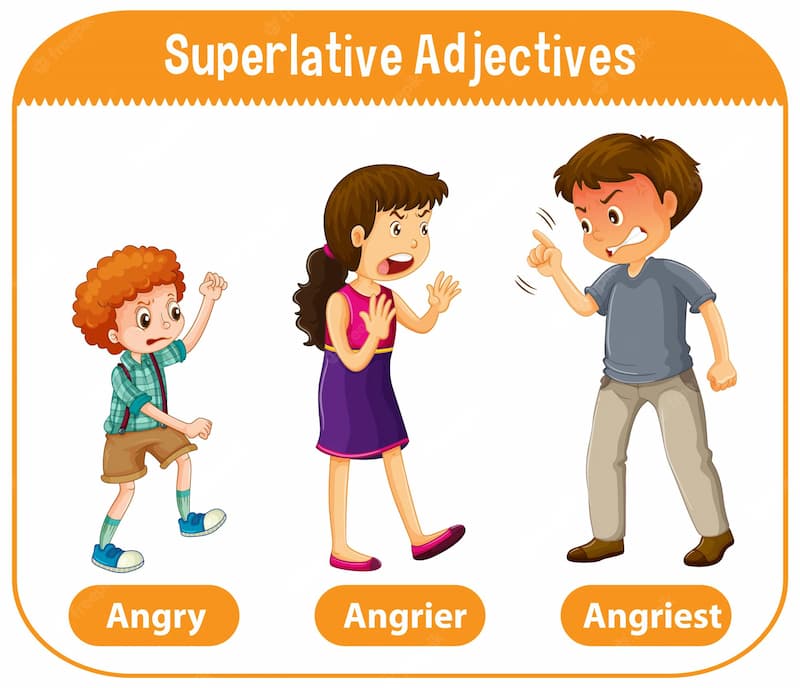
The superlative formula also has 3 forms for each type of short, long & irregular adverbs as follows:
Short adverb: S + (not) V + the + adv + est + noun
Long adverbs: S + (not) V + the + most/ least + adv + noun
Irregular adverbs: For this adverb, you need to keep in mind their superlative form when converting.
Adverb | Superlative of adverbs |
well | best |
badly | worst |
much | most |
little | least |
far | farthest/ furthest |
Comparison table of common irregular adverbs
Adverb | Compare more | Superlative |
well | better | best |
badly | worse | worst |
little (amount) | less | least |
little (size) | smaller | smallest |
much/ many | more | most |
far (place + time) | further | furthest |
far (place) | farther | farthest |
late (time) | later | latest |
near (place) | nearer | nearest |
old (people and things) | older/ elder | oldest/ eldest |
Some comparative forms are equivalent to adverbs and adjectives
Comparison with an adverb is a comparison between two equivalent actions. As for adjectives, it is a comparison between similar people, things, or phenomena.
The formula for common equality is:
S + to be/ V(not) + as + adj/ adv + as + (S + tobe/ V) + O
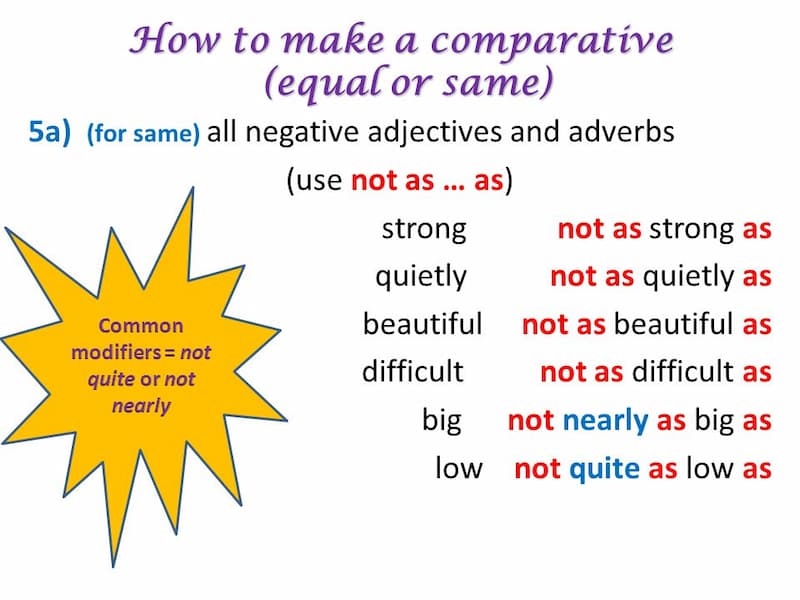
In addition to the general formula, the comparison of equals of adverbs & adjectives is also applied according to the following 4 structures:
“so/as” formula
In negative sentences, use “so” instead of “as”.
Formula: S + not as/ so + adj/ adv + O
“the same as” recipe
S + to be + the same + (noun) + as + noun/ pronoun
The formula “less… than = not as/ so… as”
S + to be + not + so/as + adj + as + noun/ pronoun/ clause
“Not as/ so…as” is used more when speaking informally.
“the same” recipe
S + V + the same + (noun) + as + noun/ pronoun
Note when using comparison with
After “than” is a personal pronoun as the subject, not the object
When comparing an object or a person with other objects or people, we add “else”
When comparing an object or person with other people or things, we must add “else” after anything/anybody.
In relative clauses, the subject after “than”, “as” can be omitted if the two subjects are the same.
Objects can be omitted after the verbs in the following clauses “than” and “as”.
In negative sentences, we can also replace the structure “not as…as” with “not so…as” to say that something is not equal to that (comparison is not equal), but do NOT replace “as…as” with “so…as” in affirmative sentences.
3 special comparative forms of English adjectives & adverbs
In addition to the above comparative, superlative and equal, adverbs also have the following special comparative forms:
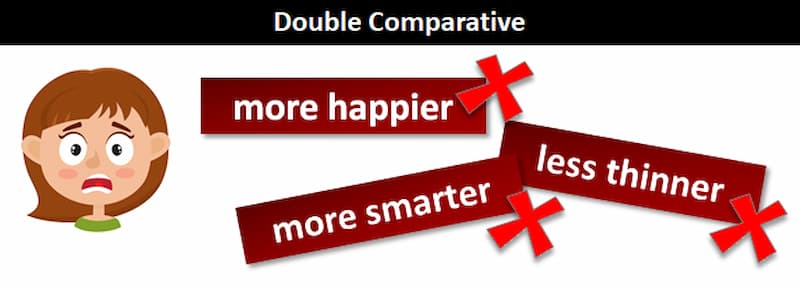
Double comparison of adverbs
In this comparison, you can do three structures:
1. The + comparative + S + V + the + comparative + S + V
Ex: The sooner you work, the better you will complete quickly.)
(The sooner you do it, the faster you’ll finish.)
2. The more + S + V + the + comparative + S + V
Ex: The more you work the professional you will become
(The more you do, the more professional you will become)
3. Short adjectives: S + V + adj + er + and + adj + er
Long adjectives: S + V + more and more + adj
Ex: The success is more and more.
(Success more and more.)
Compare many times
This is a comparative form “number of times” such as half (half), double (twice), triple (three times)… In this structure, you need to use equal comparison and must determine which noun is the form. countable or uncountable.
Formula: S + V + multiple numbers + as + much/many/adj/adv + (N) + as + O
Ex: Her bag costs twice as much as mine.
(Her bag is twice as expensive as mine.)
Note:
In the negative sentence, the first “as” can be replaced by “so”. After “as” is a personal pronoun, not an object.
Nouns can be used to compare in this case, but when doing so, it is necessary to determine whether the noun must have an equivalent adjective.
Comparatives do not use “than”
When making this comparison, there must be “the” before the adjective or adverb so as not to confuse it with the superlative. Usually, in the sentence, there will be the phrase “of the two+noun” with the meaning that 1 of 2, who or what is better than who, what.
Ex: Tom is the intelligent of the two boys.
(Tom is the smarter of the two boys)
Comparative exercises with adverbs in English
Through the above section, you have learned the comparative of adverbs and other comparative forms of this word. In the exercises section, you can practice some of the exercises below to understand the lesson better!

Exercise 1: Complete the sentences with the suggested words
1. I speak English (fluent) ___________ now than last year.
2. She greeted me (polite) ___________ of all.
3. She smiled (happy) _____ than before.
4. This girl dances (graceful) ___________ of all.
5. Could you write (clear) ___________ ?
6. Planes can fly (high) ___________ than birds.
7. He had an accident last year. Now, he drives (careful) ___________ than before.
8. Jim can run (fast) ___________ than John.
9. Our team played (bad) ___________ of all.
10. He worked (hard) ___________ than ever before.
Lesson 2: Choose the correct answer
1. I visit my parents ___________ (more often/the most often) than my brothers do.
2. He thinks he always knows ___________ . (better/best)
3. Out of all my siblings, I visit my parents ___________ (more often/the most often).
4. David did ___________ (worse/the worst) than he thought he would do on his test.
5. I did ___________ (worse/the worst) out of all the students on my test.
6. Out of all the students, Frank studied ___________ (less/the least), but got the best grade.
7. We would ___________ (longerthe longest) than I thought we would.
8. My sisters laughed ___________ (louder/the loudest) out of the whole audience.
9. The two guys who enjoyed the game ___________ (more/most) were Tom and Robert.
10. George drives ___________ (more recklessly/the most recklessly) than his brother.
Exercise 3: Choose the correct answer to complete the sentence
1. They arrived ___________ .
A. earlier than us
B. more early than we
C. earlier than we
2. Please, can you drive ___________ ?
A. slowlier
B. more slowly
C. most slowly
3. This is going to be ___________ show you have ever seen.
A. the bigger
B. the bigest
C. the biggest
4. My current job is _____ more stressful than my last job.
A. much
B. very
C. lot
5. He isn’t as ___________ you.
A. smarter as
B. smart as
C. smarter than
6. What is the ___________ option in the menu?
A. healthiest
B. most healthy
C. healthier
7. You aren’t as determined ___________ .
A. than me
B. as I
C. as I am
8. My great-grandmother is the oldest person ___________ the family.
A. of
B. from
C. in
9. This is the greatest evening I ___________ .
A. ‘ve never had
B. ever had
C. ‘ve ever had
10. York is a bit ___________ than Leeds.
A. farer
B. further
C. more far
11. The south is _____ the north.
A. hotter than
B. more hotter than
C. more hot than
12. We work _____ now with the new manager.
A. most happily
B. more happily
C. happilier
13. He is ______ England.
A. the most famous painter in
B. the famous painter in
C. the most famous painter of
14. Tuesdays are _____ than Mondays.
A. much more busy
B. much more busier
C. a lot busier
15. It’s the worst experience _____.
A. I’ve never had
B. I ever had
C. I’ve ever had
16. She eats better _____.
A. than I
B. coal
C. that I do
17. He doesn’t run _____ his brother.
A. as faster as
B. as fast as
C. fast as
18. The bus is a bit _____ the train.
A. comfortabler than
B. more comfortable as
C. more comfortable than
19. This year we are having _____ summer since 1976.
A. the most hot
B. the hottest
C. the hotter
20. We finished _____ we expected.
A. more quickly than
B. quicklier than
C. more quick than
Answers to comparative exercises with adverbs
After completing, check the answers to the adverb comparison exercise below:
Lesson 1:
1. more fluently 2. most politely 3. more happily 4. most gracefully 5. more clearly | 6. higher 7. more carefully 8. faster 9. worst 10. harder |
Lesson 2:
1. more often 2. best 3. the most often 4. worse 5. the worst | 6. the least 7. longer 8. the loudest 9. most 10. more recklessly |
Lesson 3:
1. A 2. REMOVE 3. OLD 4. A 5. A | 6. A 7. OLD 8. OLD 9C 10. REMOVE | 11. A 12. REMOVE 13. A 14. OLD 15. OLD | 16. REMOVE 17. REMOVE 18. OLD 19. REMOVE 20. A |
Above is a summary of comparative grammar of adverbs and exercises to help you master the lesson. Please review and practice often to remember the knowledge!
[toggle title=”xem thêm thông tin chi tiết về [NOTE] Các dạng so sánh hơn của trạng từ: Công thức & Bài tập minh họa” state=”close”]
[NOTE] Các dạng so sánh hơn của trạng từ: Công thức & Bài tập minh họa
Hình Ảnh về: [NOTE] Các dạng so sánh hơn của trạng từ: Công thức & Bài tập minh họa
Video về: [NOTE] Các dạng so sánh hơn của trạng từ: Công thức & Bài tập minh họa
Wiki về [NOTE] Các dạng so sánh hơn của trạng từ: Công thức & Bài tập minh họa
[NOTE] Các dạng so sánh hơn của trạng từ: Công thức & Bài tập minh họa -
In English, there are three types of comparisons: equals, not equals, and more than comparisons. This article, Trường THPT Trần Hưng Đạo will help you to understand the comparative forms of adverbs and the difference with adjectives.
What is the comparative of adverbs?
What is the comparative of adverbs? How is it different from adjectives in English? Let's find out in the first part of the lesson!
Comparative definition of the adverb
Conceptually, the comparative of adverbs is used to describe the difference between two actions, states of being in terms of time, place, manner, degree and frequency. (Note: Comparative is only used for 2 actions, 3 or more are not considered comparatives.)
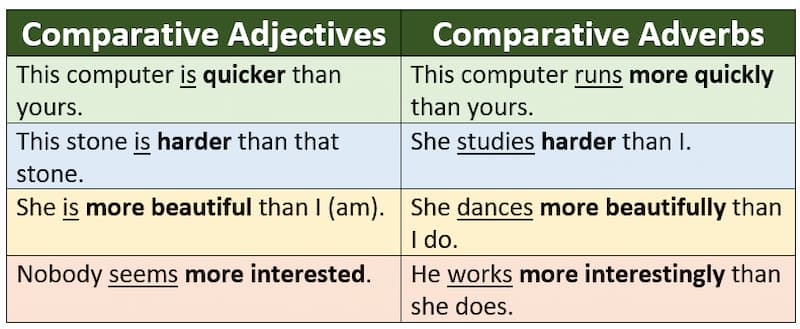
Ex: He runs faster than she does. (He runs more than her)
He drives more carelessly than I do. (He drives more recklessly than I do.)
Thus, the difference between the comparative of adjectives and adverbs is that adjectives are used to compare two nouns indicating people, things, or phenomena. And adverbs are used to compare two verbs that indicate the action or state of a person or thing.
Comparative formula of adverbs in English
Adverbs in English include short adverbs and long adverbs. For each type of adverb, the way to change it to the comparative form is different. Specifically:
Structure comparative forms with short adverbs
For short adverbs with 1 syllable, we add "-er" when changing to comparative form. For adverbs ending in "-e", we just need to add "-r".
Formula: S + (not) V + adv + er + than + noun/pronoun/clause
Ex: late => later, soon - sooner, fast => faster,...
Joe ran fast, but Mary came first because she ran faster.
(Joe ran fast, but Mary came first because she ran faster.)
Comparative transformation table with short adverbs
Adverb | Comparative of adverbs |
fast | faster |
hard | harder |
high | higher |
late | later |
long | longer |
low | lower |
wide | wider |
Comparative form with long adverbs
For adverbs with 2 or more syllables, also known as long adverbs (usually ending in "-ly"), when converted into comparative form, we need to add "more" instead of "much/ many" or "less". ” for “little/few”.
Formula: S + (not) V + more/less + adv + than + noun/pronoun/clause
Ex: slowly => more slowly, happy => more happily, sadly => less sadness, dirtily => less dirtily
Table of comparative form changes with long adverbs
Adverb | Comparative of adverbs |
carefully | more/ less carefully |
efficient | more/ less efficient |
happily | more/ less happily |
horribly | more/ less horribly |
often | more/ less often |
Quickly | more/ less quickly |
recently | more/ less recently |
slowly | more/ less slowly |
sad | more/ less sadness |
strangely | more/ less strangely |
Comparative form of irregular adverbs
Some adverbs when converted into comparative form do not add "-er" but change completely.
Adverb | Comparative of adverbs |
badly | worse |
early | earlier |
far | further/ farther |
little | less |
much | more |
well | better |
Some adverbs that have no comparative form include:
again, first
daily, yesterday
here, there
now, then
never, sometimes
Superlative of adverbs
The superlative of adverbs is used to compare the actions of a person, thing, or phenomenon most prominently among the remaining objects. Therefore, the condition to perform this comparison is that there should be 3 or more objects in the sentence.

The superlative formula also has 3 forms for each type of short, long & irregular adverbs as follows:
Short adverb: S + (not) V + the + adv + est + noun
Long adverbs: S + (not) V + the + most/ least + adv + noun
Irregular adverbs: For this adverb, you need to keep in mind their superlative form when converting.
Adverb | Superlative of adverbs |
well | best |
badly | worst |
much | most |
little | least |
far | farthest/ furthest |
Comparison table of common irregular adverbs
Adverb | Compare more | Superlative |
well | better | best |
badly | worse | worst |
little (amount) | less | least |
little (size) | smaller | smallest |
much/ many | more | most |
far (place + time) | further | furthest |
far (place) | farther | farthest |
late (time) | later | latest |
near (place) | nearer | nearest |
old (people and things) | older/ elder | oldest/ eldest |
Some comparative forms are equivalent to adverbs and adjectives
Comparison with an adverb is a comparison between two equivalent actions. As for adjectives, it is a comparison between similar people, things, or phenomena.
The formula for common equality is:
S + to be/ V(not) + as + adj/ adv + as + (S + tobe/ V) + O

In addition to the general formula, the comparison of equals of adverbs & adjectives is also applied according to the following 4 structures:
"so/as" formula
In negative sentences, use "so" instead of "as".
Formula: S + not as/ so + adj/ adv + O
"the same as" recipe
S + to be + the same + (noun) + as + noun/ pronoun
The formula “less… than = not as/ so… as”
S + to be + not + so/as + adj + as + noun/ pronoun/ clause
“Not as/ so…as” is used more when speaking informally.
"the same" recipe
S + V + the same + (noun) + as + noun/ pronoun
Note when using comparison with
After "than" is a personal pronoun as the subject, not the object
When comparing an object or a person with other objects or people, we add "else"
When comparing an object or person with other people or things, we must add "else" after anything/anybody.
In relative clauses, the subject after "than", "as" can be omitted if the two subjects are the same.
Objects can be omitted after the verbs in the following clauses "than" and "as".
In negative sentences, we can also replace the structure “not as…as” with “not so…as” to say that something is not equal to that (comparison is not equal), but do NOT replace “as…as” with “so…as” in affirmative sentences.
3 special comparative forms of English adjectives & adverbs
In addition to the above comparative, superlative and equal, adverbs also have the following special comparative forms:

Double comparison of adverbs
In this comparison, you can do three structures:
1. The + comparative + S + V + the + comparative + S + V
Ex: The sooner you work, the better you will complete quickly.)
(The sooner you do it, the faster you'll finish.)
2. The more + S + V + the + comparative + S + V
Ex: The more you work the professional you will become
(The more you do, the more professional you will become)
3. Short adjectives: S + V + adj + er + and + adj + er
Long adjectives: S + V + more and more + adj
Ex: The success is more and more.
(Success more and more.)
Compare many times
This is a comparative form “number of times” such as half (half), double (twice), triple (three times)… In this structure, you need to use equal comparison and must determine which noun is the form. countable or uncountable.
Formula: S + V + multiple numbers + as + much/many/adj/adv + (N) + as + O
Ex: Her bag costs twice as much as mine.
(Her bag is twice as expensive as mine.)
Note:
In the negative sentence, the first "as" can be replaced by "so". After "as" is a personal pronoun, not an object.
Nouns can be used to compare in this case, but when doing so, it is necessary to determine whether the noun must have an equivalent adjective.
Comparatives do not use “than”
When making this comparison, there must be "the" before the adjective or adverb so as not to confuse it with the superlative. Usually, in the sentence, there will be the phrase "of the two+noun" with the meaning that 1 of 2, who or what is better than who, what.
Ex: Tom is the intelligent of the two boys.
(Tom is the smarter of the two boys)
Comparative exercises with adverbs in English
Through the above section, you have learned the comparative of adverbs and other comparative forms of this word. In the exercises section, you can practice some of the exercises below to understand the lesson better!

Exercise 1: Complete the sentences with the suggested words
1. I speak English (fluent) ___________ now than last year.
2. She greeted me (polite) ___________ of all.
3. She smiled (happy) _____ than before.
4. This girl dances (graceful) ___________ of all.
5. Could you write (clear) ___________ ?
6. Planes can fly (high) ___________ than birds.
7. He had an accident last year. Now, he drives (careful) ___________ than before.
8. Jim can run (fast) ___________ than John.
9. Our team played (bad) ___________ of all.
10. He worked (hard) ___________ than ever before.
Lesson 2: Choose the correct answer
1. I visit my parents ___________ (more often/the most often) than my brothers do.
2. He thinks he always knows ___________ . (better/best)
3. Out of all my siblings, I visit my parents ___________ (more often/the most often).
4. David did ___________ (worse/the worst) than he thought he would do on his test.
5. I did ___________ (worse/the worst) out of all the students on my test.
6. Out of all the students, Frank studied ___________ (less/the least), but got the best grade.
7. We would ___________ (longerthe longest) than I thought we would.
8. My sisters laughed ___________ (louder/the loudest) out of the whole audience.
9. The two guys who enjoyed the game ___________ (more/most) were Tom and Robert.
10. George drives ___________ (more recklessly/the most recklessly) than his brother.
Exercise 3: Choose the correct answer to complete the sentence
1. They arrived ___________ .
A. earlier than us
B. more early than we
C. earlier than we
2. Please, can you drive ___________ ?
A. slowlier
B. more slowly
C. most slowly
3. This is going to be ___________ show you have ever seen.
A. the bigger
B. the bigest
C. the biggest
4. My current job is _____ more stressful than my last job.
A. much
B. very
C. lot
5. He isn't as ___________ you.
A. smarter as
B. smart as
C. smarter than
6. What is the ___________ option in the menu?
A. healthiest
B. most healthy
C. healthier
7. You aren't as determined ___________ .
A. than me
B. as I
C. as I am
8. My great-grandmother is the oldest person ___________ the family.
A. of
B. from
C. in
9. This is the greatest evening I ___________ .
A. 've never had
B. ever had
C. 've ever had
10. York is a bit ___________ than Leeds.
A. farer
B. further
C. more far
11. The south is _____ the north.
A. hotter than
B. more hotter than
C. more hot than
12. We work _____ now with the new manager.
A. most happily
B. more happily
C. happilier
13. He is ______ England.
A. the most famous painter in
B. the famous painter in
C. the most famous painter of
14. Tuesdays are _____ than Mondays.
A. much more busy
B. much more busier
C. a lot busier
15. It's the worst experience _____.
A. I've never had
B. I ever had
C. I've ever had
16. She eats better _____.
A. than I
B. coal
C. that I do
17. He doesn't run _____ his brother.
A. as faster as
B. as fast as
C. fast as
18. The bus is a bit _____ the train.
A. comfortabler than
B. more comfortable as
C. more comfortable than
19. This year we are having _____ summer since 1976.
A. the most hot
B. the hottest
C. the hotter
20. We finished _____ we expected.
A. more quickly than
B. quicklier than
C. more quick than
Answers to comparative exercises with adverbs
After completing, check the answers to the adverb comparison exercise below:
Lesson 1:
1. more fluently 2. most politely 3. more happily 4. most gracefully 5. more clearly | 6. higher 7. more carefully 8. faster 9. worst 10. harder |
Lesson 2:
1. more often 2. best 3. the most often 4. worse 5. the worst | 6. the least 7. longer 8. the loudest 9. most 10. more recklessly |
Lesson 3:
1. A 2. REMOVE 3. OLD 4. A 5. A | 6. A 7. OLD 8. OLD 9C 10. REMOVE | 11. A 12. REMOVE 13. A 14. OLD 15. OLD | 16. REMOVE 17. REMOVE 18. OLD 19. REMOVE 20. A |
Above is a summary of comparative grammar of adverbs and exercises to help you master the lesson. Please review and practice often to remember the knowledge!
[rule_{ruleNumber}]
[box type=”note” align=”” class=”” ltr”>What is the comparative of adverbs?
What is the comparative of adverbs? How is it different from adjectives in English? Let’s find out in the first part of the lesson!
Comparative definition of the adverb
Conceptually, the comparative of adverbs is used to describe the difference between two actions, states of being in terms of time, place, manner, degree and frequency. (Note: Comparative is only used for 2 actions, 3 or more are not considered comparatives.)

Ex: He runs faster than she does. (He runs more than her)
He drives more carelessly than I do. (He drives more recklessly than I do.)
Thus, the difference between the comparative of adjectives and adverbs is that adjectives are used to compare two nouns indicating people, things, or phenomena. And adverbs are used to compare two verbs that indicate the action or state of a person or thing.
Comparative formula of adverbs in English
Adverbs in English include short adverbs and long adverbs. For each type of adverb, the way to change it to the comparative form is different. Specifically:
Structure comparative forms with short adverbs
For short adverbs with 1 syllable, we add “-er” when changing to comparative form. For adverbs ending in “-e”, we just need to add “-r”.
Formula: S + (not) V + adv + er + than + noun/pronoun/clause
Ex: late => later, soon – sooner, fast => faster,…
Joe ran fast, but Mary came first because she ran faster.
(Joe ran fast, but Mary came first because she ran faster.)
Comparative transformation table with short adverbs
Adverb | Comparative of adverbs |
fast | faster |
hard | harder |
high | higher |
late | later |
long | longer |
low | lower |
wide | wider |
Comparative form with long adverbs
For adverbs with 2 or more syllables, also known as long adverbs (usually ending in “-ly”), when converted into comparative form, we need to add “more” instead of “much/ many” or “less”. ” for “little/few”.
Formula: S + (not) V + more/less + adv + than + noun/pronoun/clause
Ex: slowly => more slowly, happy => more happily, sadly => less sadness, dirtily => less dirtily
Table of comparative form changes with long adverbs
Adverb | Comparative of adverbs |
carefully | more/ less carefully |
efficient | more/ less efficient |
happily | more/ less happily |
horribly | more/ less horribly |
often | more/ less often |
Quickly | more/ less quickly |
recently | more/ less recently |
slowly | more/ less slowly |
sad | more/ less sadness |
strangely | more/ less strangely |
Comparative form of irregular adverbs
Some adverbs when converted into comparative form do not add “-er” but change completely.
Adverb | Comparative of adverbs |
badly | worse |
early | earlier |
far | further/ farther |
little | less |
much | more |
well | better |
Some adverbs that have no comparative form include:
again, first
daily, yesterday
here, there
now, then
never, sometimes
Superlative of adverbs
The superlative of adverbs is used to compare the actions of a person, thing, or phenomenon most prominently among the remaining objects. Therefore, the condition to perform this comparison is that there should be 3 or more objects in the sentence.

The superlative formula also has 3 forms for each type of short, long & irregular adverbs as follows:
Short adverb: S + (not) V + the + adv + est + noun
Long adverbs: S + (not) V + the + most/ least + adv + noun
Irregular adverbs: For this adverb, you need to keep in mind their superlative form when converting.
Adverb | Superlative of adverbs |
well | best |
badly | worst |
much | most |
little | least |
far | farthest/ furthest |
Comparison table of common irregular adverbs
Adverb | Compare more | Superlative |
well | better | best |
badly | worse | worst |
little (amount) | less | least |
little (size) | smaller | smallest |
much/ many | more | most |
far (place + time) | further | furthest |
far (place) | farther | farthest |
late (time) | later | latest |
near (place) | nearer | nearest |
old (people and things) | older/ elder | oldest/ eldest |
Some comparative forms are equivalent to adverbs and adjectives
Comparison with an adverb is a comparison between two equivalent actions. As for adjectives, it is a comparison between similar people, things, or phenomena.
The formula for common equality is:
S + to be/ V(not) + as + adj/ adv + as + (S + tobe/ V) + O

In addition to the general formula, the comparison of equals of adverbs & adjectives is also applied according to the following 4 structures:
“so/as” formula
In negative sentences, use “so” instead of “as”.
Formula: S + not as/ so + adj/ adv + O
“the same as” recipe
S + to be + the same + (noun) + as + noun/ pronoun
The formula “less… than = not as/ so… as”
S + to be + not + so/as + adj + as + noun/ pronoun/ clause
“Not as/ so…as” is used more when speaking informally.
“the same” recipe
S + V + the same + (noun) + as + noun/ pronoun
Note when using comparison with
After “than” is a personal pronoun as the subject, not the object
When comparing an object or a person with other objects or people, we add “else”
When comparing an object or person with other people or things, we must add “else” after anything/anybody.
In relative clauses, the subject after “than”, “as” can be omitted if the two subjects are the same.
Objects can be omitted after the verbs in the following clauses “than” and “as”.
In negative sentences, we can also replace the structure “not as…as” with “not so…as” to say that something is not equal to that (comparison is not equal), but do NOT replace “as…as” with “so…as” in affirmative sentences.
3 special comparative forms of English adjectives & adverbs
In addition to the above comparative, superlative and equal, adverbs also have the following special comparative forms:

Double comparison of adverbs
In this comparison, you can do three structures:
1. The + comparative + S + V + the + comparative + S + V
Ex: The sooner you work, the better you will complete quickly.)
(The sooner you do it, the faster you’ll finish.)
2. The more + S + V + the + comparative + S + V
Ex: The more you work the professional you will become
(The more you do, the more professional you will become)
3. Short adjectives: S + V + adj + er + and + adj + er
Long adjectives: S + V + more and more + adj
Ex: The success is more and more.
(Success more and more.)
Compare many times
This is a comparative form “number of times” such as half (half), double (twice), triple (three times)… In this structure, you need to use equal comparison and must determine which noun is the form. countable or uncountable.
Formula: S + V + multiple numbers + as + much/many/adj/adv + (N) + as + O
Ex: Her bag costs twice as much as mine.
(Her bag is twice as expensive as mine.)
Note:
In the negative sentence, the first “as” can be replaced by “so”. After “as” is a personal pronoun, not an object.
Nouns can be used to compare in this case, but when doing so, it is necessary to determine whether the noun must have an equivalent adjective.
Comparatives do not use “than”
When making this comparison, there must be “the” before the adjective or adverb so as not to confuse it with the superlative. Usually, in the sentence, there will be the phrase “of the two+noun” with the meaning that 1 of 2, who or what is better than who, what.
Ex: Tom is the intelligent of the two boys.
(Tom is the smarter of the two boys)
Comparative exercises with adverbs in English
Through the above section, you have learned the comparative of adverbs and other comparative forms of this word. In the exercises section, you can practice some of the exercises below to understand the lesson better!

Exercise 1: Complete the sentences with the suggested words
1. I speak English (fluent) ___________ now than last year.
2. She greeted me (polite) ___________ of all.
3. She smiled (happy) _____ than before.
4. This girl dances (graceful) ___________ of all.
5. Could you write (clear) ___________ ?
6. Planes can fly (high) ___________ than birds.
7. He had an accident last year. Now, he drives (careful) ___________ than before.
8. Jim can run (fast) ___________ than John.
9. Our team played (bad) ___________ of all.
10. He worked (hard) ___________ than ever before.
Lesson 2: Choose the correct answer
1. I visit my parents ___________ (more often/the most often) than my brothers do.
2. He thinks he always knows ___________ . (better/best)
3. Out of all my siblings, I visit my parents ___________ (more often/the most often).
4. David did ___________ (worse/the worst) than he thought he would do on his test.
5. I did ___________ (worse/the worst) out of all the students on my test.
6. Out of all the students, Frank studied ___________ (less/the least), but got the best grade.
7. We would ___________ (longerthe longest) than I thought we would.
8. My sisters laughed ___________ (louder/the loudest) out of the whole audience.
9. The two guys who enjoyed the game ___________ (more/most) were Tom and Robert.
10. George drives ___________ (more recklessly/the most recklessly) than his brother.
Exercise 3: Choose the correct answer to complete the sentence
1. They arrived ___________ .
A. earlier than us
B. more early than we
C. earlier than we
2. Please, can you drive ___________ ?
A. slowlier
B. more slowly
C. most slowly
3. This is going to be ___________ show you have ever seen.
A. the bigger
B. the bigest
C. the biggest
4. My current job is _____ more stressful than my last job.
A. much
B. very
C. lot
5. He isn’t as ___________ you.
A. smarter as
B. smart as
C. smarter than
6. What is the ___________ option in the menu?
A. healthiest
B. most healthy
C. healthier
7. You aren’t as determined ___________ .
A. than me
B. as I
C. as I am
8. My great-grandmother is the oldest person ___________ the family.
A. of
B. from
C. in
9. This is the greatest evening I ___________ .
A. ‘ve never had
B. ever had
C. ‘ve ever had
10. York is a bit ___________ than Leeds.
A. farer
B. further
C. more far
11. The south is _____ the north.
A. hotter than
B. more hotter than
C. more hot than
12. We work _____ now with the new manager.
A. most happily
B. more happily
C. happilier
13. He is ______ England.
A. the most famous painter in
B. the famous painter in
C. the most famous painter of
14. Tuesdays are _____ than Mondays.
A. much more busy
B. much more busier
C. a lot busier
15. It’s the worst experience _____.
A. I’ve never had
B. I ever had
C. I’ve ever had
16. She eats better _____.
A. than I
B. coal
C. that I do
17. He doesn’t run _____ his brother.
A. as faster as
B. as fast as
C. fast as
18. The bus is a bit _____ the train.
A. comfortabler than
B. more comfortable as
C. more comfortable than
19. This year we are having _____ summer since 1976.
A. the most hot
B. the hottest
C. the hotter
20. We finished _____ we expected.
A. more quickly than
B. quicklier than
C. more quick than
Answers to comparative exercises with adverbs
After completing, check the answers to the adverb comparison exercise below:
Lesson 1:
1. more fluently 2. most politely 3. more happily 4. most gracefully 5. more clearly | 6. higher 7. more carefully 8. faster 9. worst 10. harder |
Lesson 2:
1. more often 2. best 3. the most often 4. worse 5. the worst | 6. the least 7. longer 8. the loudest 9. most 10. more recklessly |
Lesson 3:
1. A 2. REMOVE 3. OLD 4. A 5. A | 6. A 7. OLD 8. OLD 9C 10. REMOVE | 11. A 12. REMOVE 13. A 14. OLD 15. OLD | 16. REMOVE 17. REMOVE 18. OLD 19. REMOVE 20. A |
Above is a summary of comparative grammar of adverbs and exercises to help you master the lesson. Please review and practice often to remember the knowledge!
[/box]
#NOTE #Các #dạng #sánh #hơn #của #trạng #từ #Công #thức #Bài #tập #minh #họa
[/toggle]
Bạn thấy bài viết [NOTE] Các dạng so sánh hơn của trạng từ: Công thức & Bài tập minh họa có giải quyết đươc vấn đề bạn tìm hiểu không?, nếu không hãy comment góp ý thêm về [NOTE] Các dạng so sánh hơn của trạng từ: Công thức & Bài tập minh họa bên dưới để thpttranhungdao.edu.vn có thể chỉnh sửa & cải thiện nội dung tốt hơn cho độc giả nhé! Cám ơn bạn đã ghé thăm Website Trường THPT Trần Hưng Đạo
Chuyên mục: Giáo dục
#NOTE #Các #dạng #sánh #hơn #của #trạng #từ #Công #thức #Bài #tập #minh #họa
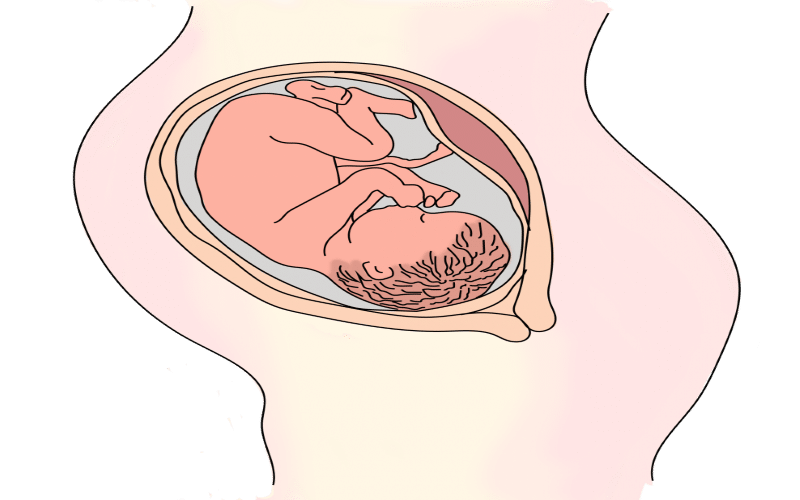

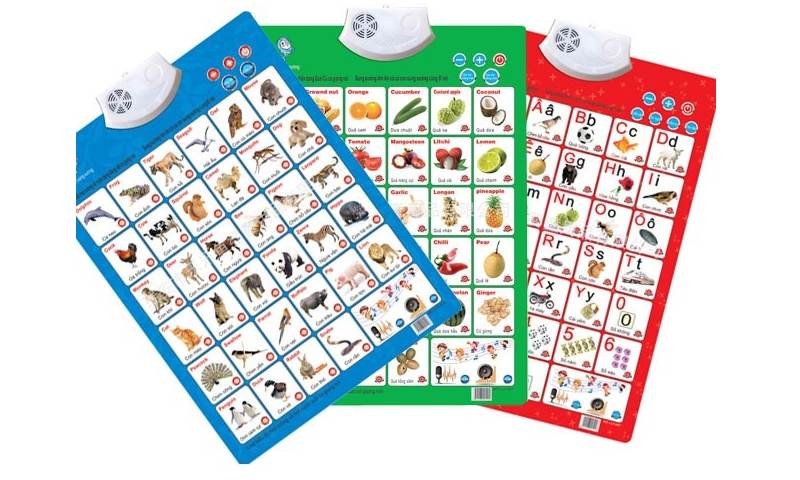
Trả lời